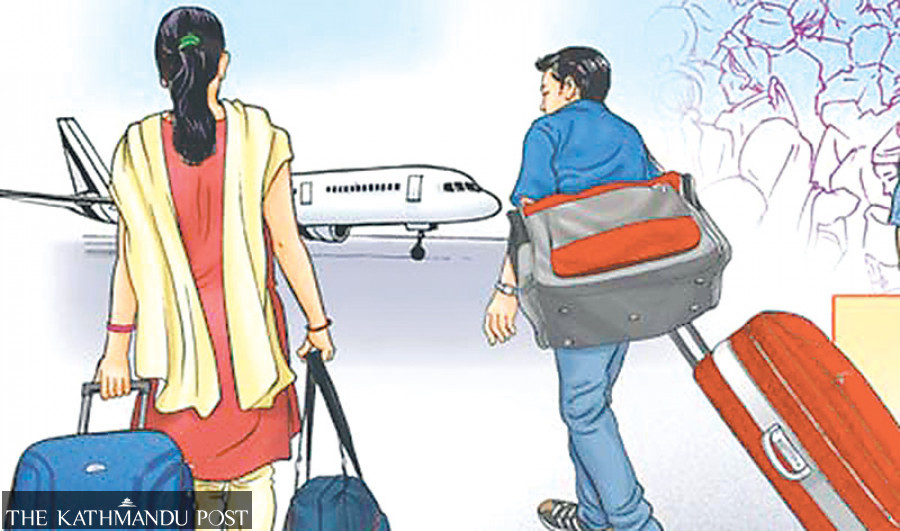National
Israel caregiver job vacancies receive huge response from Nepali youths
For 1,000 caregiver jobs, more than 5,000 candidates have already applied and over 20,000 are in the application process. The application deadline expires on August 16.
Chandan Kumar Mandal
There has been an overwhelming response from Nepali youths for caregiver jobs in Israel with thousands of them joining the application process.
With the Department of Foreign Employment, the central government body overseeing the labour migration sector including the management of Nepali workers’ migration to Israel, soliciting applications for these jobs, thousands of Nepalis have approached the department.
The department has announced vacancies for caregiver jobs as per a recent agreement signed between Nepal and Israel last September.
According to Krishna Prasad Dawadi, director general of the department, around 20,000 to 21,000 youths have registered themselves on the department’s portal set up for accepting applications from aspirant candidates.
“As of Monday, around 5,000 candidates have already submitted their job applications,” Dawadi told the Post. “If we only consider those who have registered on our portal and received their identification numbers, they number over 20,000.”
According to Dawadi, although many people have registered themselves on the portal and received identification numbers, they have yet to complete the applications because they need to upload certain documents.
“Many people have left their job applications midway as various documents have to be submitted, but nearly 5,000 have already completed their applications. This shows the response for these jobs is good,” said Dawadi.
As part of the understanding between Nepal and Israel which paved the way for Nepali nationals to work in hospitals, nursing homes and daycare centres in Israel, the department had announced vacancies on July 12.
The vacancy notice was finally published after Israel made demands for Nepali caregivers after a long wait of nearly 10 months of signing the deal.
Under the existing agreement, Israel would hire 1,000 Nepali caregivers.
However, over five times this number have already applied and around twenty times have shown interest by registering themselves on our portal.
“There are two reasons for this level of response. First, rarely do vacancies for such a large number of posts are announced from anywhere at one time. Second, the salary, which is USD1,600 a month, is attractive even for foreign employment,” said Dawadi. “For anyone who has completed higher secondary education and received three months of caregiver training, the salary is very good.”
Although the Israeli jobs look lucrative, they come with a cost. A worker has to spend an estimated Rs165,700 once they are selected for the job, a provision which has been criticised for making workers bear the job-related costs and fees.
Other eligibility criteria for these jobs is the candidate has to be between 25-45 years of age, weigh at least 45 kg and should be 1.5 metres tall.
As for the educational qualifications, candidates with ten years of schooling will require a 15-month pre-diploma course such as community medicine assistant (CMA) or auxiliary nurse-midwifery (ANM). And those with higher secondary schooling will need three months of caregiver training.
The candidates should have completed these courses from an institution affiliated with the Council for Technical Education and Vocational Training (CTEVT) or received caregiver training at an institute registered with the Department of Foreign Employment. Besides, they need to exhibit their proficiency of English language for communicating in English while taking care of people in nursing homes in Israel.
Once the application deadline ends on August 16, they will have to sit for exams to get selected. As the examinations are to be held in person, the department will have to obtain permission from the Covid-19 Crisis Management Centre (CCMC) for conducting the examinations.
The department is mulling over conducting the examinations in the second week of Bhadra which will be the last week of August if the CCMC gives permission to conduct exams.
According to Dawadi, candidates will be required to appear for a written exam which will examine their English language proficiency and skills and understanding of caregiving jobs.
“The written test will carry a full mark of 80. These questions will be of objective type with multiple choices,” said Dawadi. “After the written test, they will also be required to appear for a face-to-face interview, which carries 20 marks.”
A candidate will have to score minimum 50 marks from both written and interview—minimum 40 from written test and 10 marks from interview—to pass the exam.
The department will then prepare a merit list of 1,400 candidates among those who will clear both the written examination and interview, combining their examination scores.
“The merit list will be shared with the Israeli authorities that will then pick 1,000 candidates,” said Dawadi. “Passing exams is not enough. The candidates will also have to secure their positions on the merit list and then be picked by the Israeli side.”




 22.65°C Kathmandu
22.65°C Kathmandu













